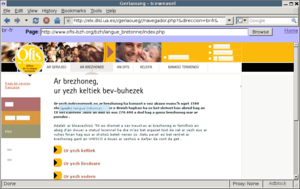Difference between revisions of "Geriaoueg"
Jump to navigation
Jump to search
(→Todo) |
(→Todo) |
||
| Line 9: | Line 9: | ||
* Make it deal with different character encodings (at least ISO-8859-x and UTF-8) |
* Make it deal with different character encodings (at least ISO-8859-x and UTF-8) |
||
* Make it work with Internet Explorer |
* Make it work with Internet Explorer |
||
* Extend it to support more languages |
* Extend it to support more languages (at least all of the trunk/ languages — approx. 20) |
||
* Internationalisation of the interface (.po-ise all strings) |
* Internationalisation of the interface (.po-ise all strings) |
||
* Make it prettier (see for example BBC Vocab and Lingro) |
* Make it prettier (see for example BBC Vocab and Lingro) |
||
Revision as of 10:42, 27 March 2010
Geriaoueg is a set of scripts which use apertium morphological analysers (see list of dictionaries) and a bilingual wordlist to provide vocabulary help when browsing the web. It was inspired by the BBC's "Vocab" tool. The software can be found in SVN under apertium-tools/geriaoueg, currently it works with most web browsers with the exception of Internet Explorer.
In order to set up the software for a new pair of languages you will need a morphological analyser which outputs Apertium format analyses (e.g. with lttoolbox or sfst) and a bilingual tab-separated wordlist. It is hoped that this will make Apertium format resources more useful to more people, and be a step toward building a full machine translation system.
Todo
- Make it parse HTML better — there will be a list of websites it is expected to parse, e.g. BBC News, VilaWeb, VOA, Wikipedia
- Make it deal with different character encodings (at least ISO-8859-x and UTF-8)
- Make it work with Internet Explorer
- Extend it to support more languages (at least all of the trunk/ languages — approx. 20)
- Internationalisation of the interface (.po-ise all strings)
- Make it prettier (see for example BBC Vocab and Lingro)
- An option which will only highlight the words above/under a certain frequency freshhold, like a sliding bar. For beginners they can have all the words highlighted, but for more advanced readers, they can have only the most infrequent words.
